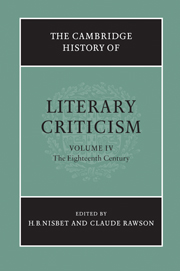Book contents
- Frontmatter
- INTRODUCTION: CRITICISM AND TRADITION
- GENRES
- 3 Poetry, 1660-1740
- 4 Poetry, after 1740
- 5 Drama, 1660-1740
- 6 Drama, after 1740
- 7 Prose fiction: France
- 8 Prose fiction: Great Britain
- 9 Prose fiction: Germany and the Netherlands
- 10 Historiography
- 11 Biography and autobiography
- 12 Criticism and the rise of periodical literature
- LANGUAGE AND STYLE
- THEMES AND MOVEMENTS
- LITERATURE AND OTHER DISCIPLINES
- Bibliography
- Index
- References
10 - Historiography
from GENRES
Published online by Cambridge University Press: 28 March 2008
- Frontmatter
- INTRODUCTION: CRITICISM AND TRADITION
- GENRES
- 3 Poetry, 1660-1740
- 4 Poetry, after 1740
- 5 Drama, 1660-1740
- 6 Drama, after 1740
- 7 Prose fiction: France
- 8 Prose fiction: Great Britain
- 9 Prose fiction: Germany and the Netherlands
- 10 Historiography
- 11 Biography and autobiography
- 12 Criticism and the rise of periodical literature
- LANGUAGE AND STYLE
- THEMES AND MOVEMENTS
- LITERATURE AND OTHER DISCIPLINES
- Bibliography
- Index
- References
Summary
No English historian at the time of the Restoration would ever have prophesied that a century later one of his successors would be bold enough to proclaim: ‘History is the most popular species of writing’. Nor could he have foreseen that, in the words of Hume, Britain would become ‘the historical nation’. On the contrary, he might have been inclined to think that France or Italy with their Oratorians, their Benedictines, their Jansenists and their long tradition of scholarship would be more likely to distinguish themselves in the field. Besides, in England and elsewhere in Europe, the drama was favoured above all other species of writing, and booksellers had not yet created the conditions which were to make history what it is now, one of the very few literary genres that finds its way on to railway bookstalls. The Restoration historian, like so many historians before and since, made the wrong guess about the future because, with all his knowledge of the past, he could not free himself from the present.
In seventeenth-century England, an antiquarian might write about long-forgotten events and a statesman in disgrace might relate the history of his life and times. What they had in common was their love of the past, their scholarly turn of mind, their common preoccupation with documents; but society did not consider them as belonging to the same walk of life and they attached their loyalties to different milieus. Most highly distinguished among them all were the King's historiographers in France and in England.
- Type
- Chapter
- Information
- The Cambridge History of Literary Criticism , pp. 282 - 301Publisher: Cambridge University PressPrint publication year: 1997

